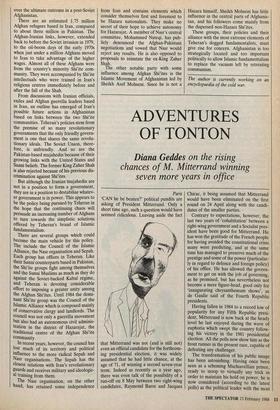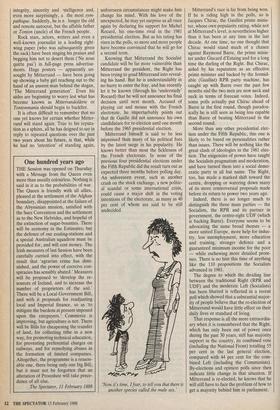ADVENTURES OF TONTON
Diana Geddes on the rising
chances of M. Mitterrand winning seven more years in office
Paris `CAN he be beaten?' political pundits are asking of President Mitterrand. Only a short time ago, such ,a question would have seemed ridiculous. Leaving aside the fact that Mitterrand was not (and is still not) even an official candidate for the forthcom- ing presidential election, it was widely assumed that he had little chance, at the age of 71, of winning a second seven-year term. Indeed as recently as a year ago, there was even talk of the possibility of a run-off on 8 May between two right-wing candidates, Raymond Barre and Jacques Chirac, it being assumed that Mitterrand would have been eliminated on the first round on 24 April along with the candi- dates of the smaller parties.
Contrary to expectations, however, the last two years of 'cohabitation' between a right-wing government and a Socialist pres- ident have been good for Mitterrand. He has won the gratitude of the French people for having avoided the constitutional crisis many were predicting, and at the same time has managed to preserve much of the prestige and some of the power (particular- ly in regard to defence and foreign policy) of hi's office. He has allowed the govern- ment to get on with the job of governing, as he promised, but has nevertheless not become a mere figure-head, good only for `inaugurating chrysanthemum shows', as de Gaulle said of the Fourth Republic presidents.
Having fallen in 1984 to a record low of popularity for any Fifth Republic presi- dent, Mitterrand is now back at the heady level he last enjoyed during the wave of euphoria which swept the country follow- ing his victory in the 1981 presidential election: All the polls now show him as the front runner in the present race, capable of defeating any challenger.
The transformation of his public image has been astonishing. Having once been seen as a scheming Machiavellian prince, ready to stoop to virtually any trick in order to maintain his hold on power, he is now considered (according to the latest polls) as the political leader with the most integrity, sincerity and ntelligence and, even more surprisingly, a the most sym- pathique. Suddenly, he is n longer the old and remote autocrat, but the affable father or Tonton (uncle) of the French people.
Rock stars, actors, writers and even a well-known journalist in a leading right- wing paper (who was subsequently given the sack) have been singing his praises and begging him not to desert them Me nous quitte pas') in full-page press advertise- ments. Huge posters — apparently un- sought by Mitterrand — have been going up showing a baby girl reaching out to the hand of an unseen man behind the slogan, `The Mitterrand generation'. Even his aides are beginning to worry lest what has become known as Mitterrandoldtrie or Tontonmania should begin to backfire.
It is often difficult to remember that no one yet knows for certain whether Mitter- rand will stand again. True to his reputa- tion as a sphinx, all he has deigned to say in reply to repeated questions over the past two years about his future, is that, while he had no 'intention' of standing again, unforeseen circumstances might make him change his mind. With his love of the unexpected, he may yet surprise us all once again by declaring his support for Michel Rocard, his one-time rival in the 1981 presidential election. But as his rating has risen in the polls, so more and more people have become convinced that he will go for a second term.
Knowing that Mitterrand the Socialist candidate will be far more vulnerable than Mitterrand the president, the Right has been trying to goad Mitterrand into reveal- ing his hand. But he is understandably in no hurry to enter the fray, and has recently let it be known (through his 'understudy' Rocard) that he will not announce his final decision until next month. Accused of playing cat and mouse with the French electorate, he imperturbably points out that de Gaulle did not announce his own candidature for re-election until one month before the 1965 presidential election.
Mitterrand himself is said to be less impressed than many of his political foes by the latest surge in his popularity. He knows better than most the fickleness of the French electorate. In none of the previous four presidential elections under the Fifth Republic did the result turn out as expected three months before polling day. An unforeseen event, such as another crash on the stock exchange, a new politic- al scandal or some international crisis, could cause a major shift in the voting intentions of the electorate, as many as 40 per cent of whom are said to be still undecided.
Wow it's time, I fear, to tell you that there is another species called the male sex.' Mitterrand's race is far from being won. If he is riding high in the polls, so is Jacques Chirac, the Gaullist prime minis- ter, whose own popularity rating, while not at Mitterrand's level, is nevertheless higher than it has been at any time in the last decade. At one time, no one thought that Chirac would stand much of a chance against Raymond Bane, the prime minis- ter under Giscard d'Estaing and for a long time the darling of the Right. But Chirac, aided by his reputation as an effective prime minister and backed by the formid- able (Gaullist) RPR party machine, has caught up with Bane over the past few months and the two men are now neck and neck in terms of forecast votes. Indeed, some polls actually put Chirac ahead of Bane in the first round, though paradox- ically he is still seen as being less capable than Barre of beating Mitterrand in the second round.
More than any other presidential elec- tion under the Fifth Republic, this one is likely to be based on personalities rather than issues. There will be nothing like the great clash of ideologies in the 1981 elec- tion. The exigencies of power have taught the Socialists pragmatism and moderation, and have turned them into a social demo- cratic party in all but name. The Right, too, has made a marked shift toward the centre, dropping or watering down many of its more controversial proposals made before its return to power two years ago.
Indeed, there is no longer much to distinguish the three main parties — the Socialists, the RPR and its partner in government, the centre-right UDF (which is backing Bane). Everyone seems to be advocating the same broad themes — a more united Europe, more help for indus- try, less unemployment, more education and training, stronger defence and a guaranteed minimum income for the poor — while eschewing more detailed prom- ises. There is no hint this time of anything like the 110 propositions the Socialists advanced in 1981.
The degree to which the dividing line between the traditional Right (RPR and UDF) and the moderate Left (Socialists) has been blurred is reflected in a recent poll which showed that a substantial major- ity of people believe that the re-election of Mitterrand would have little effect on their daily lives or standard of living.
That response is all the more extraordin- ary when it is remembered that the Right, which has only been out of power once during the past 30 years, still has majority support in the country, its combined vote (including the National Front) totalling 55 per cent in the last general election, compared with 44 per cent for the com- bined Left (including the Communists). By-elections and opinion polls since then indicate little change in that situation. If Mitterrand is re-elected, he knows that he will still have to face the problem of how to get a majority behind him in parliament.



























































 Previous page
Previous page